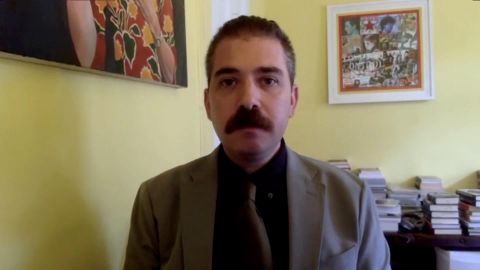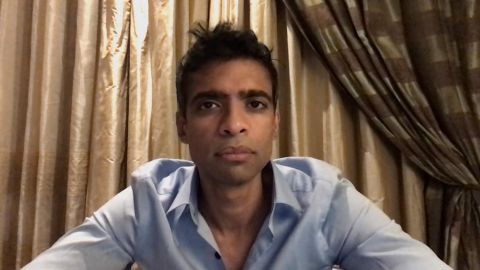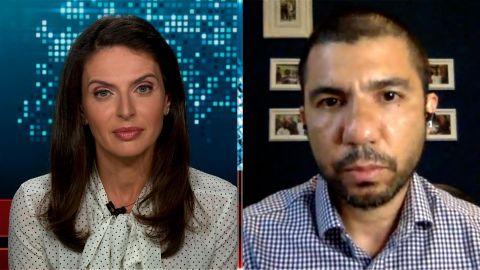Read Transcript EXPAND
BIANNA GOLODRYGA: And we’ll have much more on this series tomorrow. We’ll hear from Joseph Pfeifer, who was the first New York fire chief to respond on 9/11. Of course, what followed was those attacks — to those attacks was President George W. Bush’s declaration of what he called the war on terror. But what did the war actually entail and what are the consequences today? Spencer Ackerman is a long-time national security reporter who has spent years investigating this. In his new book “Reign of Terror”, it charts the 9/11 era to stabilize America and produced President Trump. Here he is talking to Hari Sreenivasan.
(BEGIN VIDEO CLIP)
HARI SREENIVASAN: Bianna, thanks. Spencer Ackerman, thanks for joining us. First, let’s pick apart the title a little bit. The second part of the book title, “Reign of Terror” is “How the 9/11 Era Destabilized America and Produced Trump.” So, that topline thesis, I mean, you spent an entire 400 pages breaking this down, but for the layman’s terms kind of, how do we get from this era of 9/11 to Trump?
SPENCER ACKERMAN, AUTHOR, “REIGN OF TERROR”: So, 9/11 and the war on terror that results from it is a doorway into American history and particularly, a doorway that opens to the most nativist, the most racist and the most violent elements of American history, and allows those tendencies in American history to retake power under cover of a national emergency that requires, in the telling of the war on terror, violent redress. Culturally, it creates an atmosphere of fear, hysteria and anger towards Islam in general and toward American Muslims specifically, and sweeping in a lot of very extent (ph) and very traditional nativist rage against immigration and the processes that enable it. And then, once in power, it starts to transform the Americans security apparatus into something far more lawless and far more punitive than recent history had, even though it builds upon a lot of foundations, particularly mass incarceration, that already exist in American history. And then, the war starts to go terribly. They start to be very obvious disasters. And for a segment of the population that had their traumatic reactions to 9/11 manipulated, particularly by right wing politicians with the acquiescence of Democratic politicians, this condition becomes kind of intolerable, and they go searching for evermore civilizational explanations and seek political leadership that will channel that rage. And that is what sets the stage for Donald Trump.
SREENIVASAN: And you’re saying basically that he saw that, understood that, tapped into that, in a way that previous politicians had not?
ACKERMAN: In a way that recognized that the sub text of 9/11, all of this nativism, was not some kind of accident or some kind of unfortunate by- product, but was, in fact, the heart of the enterprise. And he allowed that to be the script of the kind of polite veneers of euphemism that previous Democratic and Republican politicians had kind of hinted at but shied away from. Under Donald Trump, the war on terror becomes its most authentic self.
SREENIVASAN: You know, just the very phrase war on terror, I mean, at one sense it’s so vague and shifting that you can’t really beat it. I mean, you’re trying to beat fear. And then, in the other sense, you could fashion this war against whatever foe you like.
ACKERMAN: That’s correct. The name itself is something of a social compromise. It avoids naming an enemy, which has tremendous potential to any president that’s already empowered, thanks to the 2001 authorization to use military force, however that president wants to define that enemy. So, it provides enormous opportunity for executive leadership to simply, as the need fits, wreck on who the enemy of the war on terror is, who the apparatus is aimed at. But simultaneously, the war on terror is only aimed at Muslims. White terror never has anything to fear from the war on terror. And in that euphemism, there’s lots of opportunity for either challenge from either the socialist left or the nationalist right to say that the euphemism is a harmful thing. But it’s really only the right that gets the chance, particularly under Donald Trump, to replace the terminology outside of polite social settings with what it believes the war on terror truly is at its heart, a war against what Donald Trump calls radical Islamic terror.
SREENIVASAN: So, you’re saying that this is essentially a way for us to sugarcoat that we’re really only talking about attacks from Muslim brown guys from overseas? Because one of the justifications for the intelligence apparatus, the counterterrorism infrastructure that we’ve built is, hey, you know what, since 9/11, we haven’t had that type of an attack.
ACKERMAN: That’s correct. This was never going to be an enterprise that cared a thing about, say, white terror training camps in Northeastern Oklahoma or the Pacific Northwest or any of the hundreds of militias around the country made up of white people with guns from — you know, on the border or in the interior. Those very often, particularly those that view themselves as part of a patriotic legacy within American history and represented by people in its dominant racial caste, are going to be accustomed by the war on terror and by that history to view themselves as counter terrorists regardless of the violence that they in fact inflict and the anti-democratic possibilities that they represent.
SREENIVASAN: You are not writing a book that is just taking aim at Republicans. I mean, you spend a fair amount of pages going through ways that Democrats, liberals have contributed to the security apparatus that we all live under, the surveillance state that we’re part of now.
ACKERMAN: That’s correct. To tell the story of 9/11 as just a story of, you know, Republicans seeking power and disfiguring the constitution and culturally, and from a law enforcement perspective, persecuting Muslims is to tell only half the story. The story I tell through the middle of the book and then the end of the book is a story about democratic and liberal acquiescence and justification of the war on terror, a deep, deep fear, kind of a hangover of Cold War anti-communism and what that meant for liberalism and for the liberal political coalition of deciding that the safest thing to do in an atmosphere of inflamed nativism is to simply go along with it so as not to fall in its cross hairs. Barack Obama makes the war on terror truly forever. He makes it technocratic. He makes it less conspicuous and he maintains it in such a way that he treats only the Iraq war and CIA torture as really enterprises that ought to be jettisoned and the rest of the enterprise is something that responsible leadership requires. That, more than any other action, not just makes the war on terror truly forever, but does so by creating a democratic legacy for the war on terror, and we see that in the people who populate Joe Biden’s national security apparatus.
SREENIVASAN: So, what’s your laundry list? What are the systems or structures or committees, commissions? I mean, what would you dismantle to start to take this down?
ACKERMAN: How much time do you have? Yes, I’ll answer your question this way. I — after reporting on this war from Iraq, from Afghanistan, from Guantanamo Bay, from Washington, from New York, from around the country, from, you know, other parts of the world, I have come to see that there is no future for the war on terror that can simultaneously be a democratic future, be a future that allows for freedom and dignity not only at home, but abroad. The only way of doing that is by breaking the war on terror. Only an abolitionist approach is an approach that can restore what is supposedly vital about America, and also stop doing this extraordinary amount of harm in the world. We just found from the costs of war project at Brown University that a very analytically conservative estimate of the cost of the war on terror is 900,000 people dead. That is not something the political establishment has reckoned with, its responsibility, its culpability and how to make right the fact that so many people over a generation are dead at the hands of the United States. And that’s not even counting the tens of millions of refugees the United States has created. That’s not counting the wealth transfers that the United States has engendered. The only thing to do at this point is to stop doing harm and start breaking the institutional authorities of the war on terror, start doing things like dismantling the Department of Homeland Security, abolishing — act, repealing the authorization to use military force after 9/11 and really on down the list. You know, withdrawal not only from Afghanistan, but from Iraq, the end of the drone wars, the end of bulk surveillance, the end not only of Guantanamo Bay, but of indefinite detention. The legal structures necessary to ensure that all of this ends durably. And then, probably the most fundamentally, the reckoning that Americans need with the concept of American exceptionalism, the concept that America, by virtue of its virtue, allegedly, has both the right and the responsibility to police the globe, to build structures around the globe that benefit it, to ensure that it is the actor of history, not the one acted upon.
SREENIVASAN: You spoke to Ben Rhodes, one of the advisers to President Obama, who kind of comes back and says, listen, what if there was — what if we did everything that you’re asking, Spencer? What if we started to dismantle this apparatus and we had another attack on American soil and what would we do? I mean, I think that maybe there — through that answer is implied a political cost, but what about the sort of societal cost?
ACKERMAN: Well, look, what that is really talking about in that moment, and I appreciated the honesty of his answer, is that the political fear of 9/11 that the Democrats display so frequently, both up to that point and beyond, is still very much in effect. Ben is afraid of another terrorist attack, crippling Obama’s presidency. What he is not doing is articulating the rationale that I think, you know, Ben Rhodes in 2021 holds, which is that if you continue the war on terror, then the democratic erosion is going to be really substantial and it’s going to be very scary. And he’s also exempting Obama from having to say how the war on terror in fact ends, if it doesn’t end with the killing of Osama bin Ladin. What Ben is further neglecting is that the war on terror itself generates its own enemies, generates precisely the circumstance he fears. And then, finally, there has been a tremendous amount of terrorism on American soil. Think about the El Paso shooting, the worst act of anti- Hispanic violence in the, you know, 21st century and, you know, quite possibly in the 20th century of America. Think about the Tree of Life shooting, the worst act of anti-Semitic violence in American history, which has specifically sparked by these “replacement fears” after Trump stirs up fears of the “migrant caravan.” And then, also, remember the shooting by Dylann Roof at the Emmanuel Church in 2015. There is a tremendous amount of terrorism, that is to say violence against civilians for the purposes of advancing a political agenda that the war on terror ignores, the war on terror doesn’t see, and then, finally, ultimately, represents the erosion of America’s social fabric, that the war on terror has nothing to say about.
SREENIVASAN: Is there something to the idea that since we have accumulated the greatest amount of wealth and power and military might, that it is in lots of people’s views our responsibility not necessarily to be the global cop, but to stand up for those rights, those freedoms that we claim to cherish? Should we not be upset about what’s happened in Afghanistan and how the Taliban is going to roll back the civil and human rights of people? Should we not be fighting al-Qaeda or ISIS anywhere where they gain a stronghold?
ACKERMAN: We should certainly be angry about what we see in Afghanistan, but it’s important to be specific about what we’re seeing that makes us angry. What the media portrayal, by and large, of the withdrawal from Afghanistan has accomplished is divorcing the horrors at the Kabul Airport from the 20 years of war that made the Taliban stronger. It only blamed the United States for these conditions for ceasing the fight the war, rather than recognizing and contextualizing appropriately that the war made the Taliban stronger and brought the United States to this point. The best time to leave Afghanistan was always going to be yesterday. The second-best time was always going to be today. The worst time was always going to be tomorrow. And that’s what the coverage — not just missed, but missed in an important way that demonstrates the problem with the war on terror broadly, which is that the United States never allows itself to recognize that the war on terror generates its own enemies and makes Americans less safe. The precise thing that it is trying to avoid. What really makes the American people safe is not a structure in which wealth and military power determine the order of the world. What makes them safe is people acting internationally in solidarity with one another to address their actual material needs and historical grievance. That is safety in an age when, as we are seeing from COVID, as we are seeing from the climate apocalypse that is upon us, actually addresses the real safety of real human beings. And then, finally, what it stops us from doing is recognizing that when America is doing harm, it has to stop doing harm. That is an obligation that America has consistently not just in the war on terror, but throughout American history refused to recognize and refused to provide material recompense to the people America has harmed.
SREENIVASAN: The book is called “Reign of Terror: How the 9/11 Era Destabilized America and Produced Trump.” Author Spencer Ackerman, thanks so much for joining us.
ACKERMAN: Thank you so much for having me, Hari.
About This Episode EXPAND
Anand Gopal; Daniel Bogado; Spencer Ackerman; Sandra Cisernos
LEARN MORE



